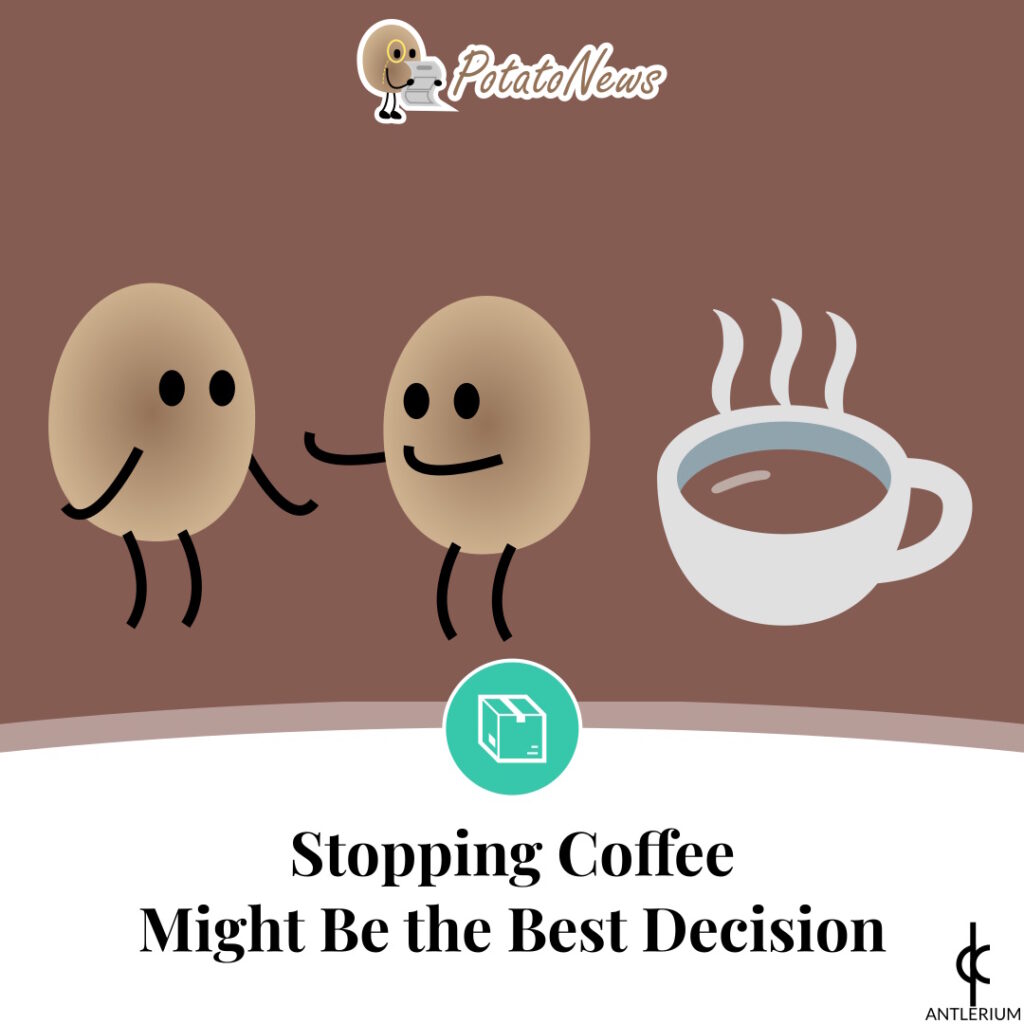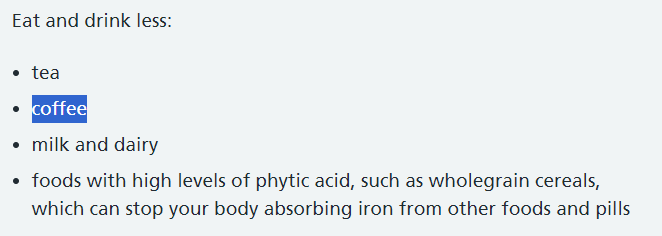Stopping Coffee Might Be the Best Decision
Are you addicted to coffee? Make sure to read till the end to see the risk of coffee intake, then consider cutting off coffee intake.
So recently Hong Kong McDonald's decided to stop serving McDonald's Coffee starting from the 4th of September. Some people are triggered and claimed they would stop going to McDonald's, while this is a stunt McDonald's made to roll out instant Americano to replace coffee.
So, how I react to the news?
Well, it didn't affect me. I think that coffee is unhealthy and drinking coffee is not my routine. McDonald's stop serving coffee is fine.
Perhaps it is an opportunity for people to rethink whether should they drink coffee on a daily basis.
This is Antlerium PotatoNews, a series focusing on the daily lives of ordinary people, including objects. Today we explore the cons of drinking coffee and coffee alternatives.

The time of drinking coffee can affect your quality of life
The rich caffeine content in coffee is the key factor behind its ability to boost brain function, making people feel sharper and smarter for a period of time.
However, excessive reliance on caffeine can have a negative impact on our performance during non-caffeine periods.
When we become overly dependent on coffee, we start incorporating it into our daily routine. At times, we may lose track of time and consume coffee in the evening, which is detrimental.
To have a good quality sleep you should not drink coffee after 2 p.m.
The effects of caffeine can last up to 5-7 hours, although the tolerance of caffeine varies from person to person, some people even last up to 10 hours.
Consuming coffee late in the day can disrupt our sleep schedule and potentially lead to insomnia.
If you're interested in tackling insomnia, I have an article on the subject that you can read here. But preventing insomnia is the most important. You should force yourself to avoid coffee after 2 p.m.
Coffee intake can cause iron deficiency, especially risky for women
Coffee can block iron absorption. Usual coffee drinkers may find out that they have hair loss, pale skin, brittle fingernails, headaches or are particularly scared of colds. These are the symptoms of anaemia.
Women are riskier to suffer from iron deficiency, because they have menstruation.
No matter how many researches claim that coffee "does not inhibit iron absorption", multiple cases of iron-deficiency anaemia have seen patients constantly drink coffee.
Therefore, medical authorities usually advise people with a high risk of iron deficiency to avoid drinking coffee. It is clearly listed by the NHS as food to avoid in case of iron deficiency.

Chronic coffee intake can cause bone loss
Caffeine or oxalic acid substances in coffee can reduce calcium absorption or bone calcium release, and increase the risk of osteoporosis.
I found a news report claiming that a cup of coffee a day has almost no effect on bone loss. But if you lack exercise and are on a diet while being a chronic coffee drinker, do not underestimate the risk.
Not a lot of people care about osteoporosis when they are still young, but seriously, osteoporosis can happen to anyone who is above 30 years old.
If you are concerned about your bone health, you must cut down on caffeine intake.
Coffee intake may intensify emotional issue
Caffeine can cause restlessness and nervousness. Individuals who already struggle with anxiety, depression, or primary insomnia should avoid drinking coffee, as caffeine can exacerbate these conditions.
In the coffee and tea article, I have briefly mentioned that coffee can potentially cause jitters and anxiety.
Some of you may heard that coffee can provide relief from emotional issues. But the research I have conducted does not support this claim.
In the article from Medical News Today, it clearly states that "not all studies agree that caffeine only has positive effects for people with depression".
If scholars are uncertain whether coffee can help emotional issue, we should not consider coffee as a means to alleviate or protect against depression.
Should we stop drinking coffee?
So far, our major concerns over coffee are these 4 problems.
Coffee can cause:
- Sleep disorder
- Iron deficiency anaemia
- Osteoporosis
- Emotional problem intensify
We still haven't talked about how overly relying on caffeine is bad.
If you want your mind to be sharp, doing regular exercise can help. Why choose coffee intake?
If you want to boost productivity doing office work, having regular breaks can help. Why choose coffee intake? Why don't you try a working technique like the Pomodoro Technique?
Should we drink that much coffee?
"But I am addicted to coffee, how to quit?" Instantly quitting coffee is highly undoable. Cutting caffeine should be gradual. Try this step-by-step approach.
Procedure to end coffee addiction
- 1 cup per day, drink only in the morning.
- 1 cup per working day, no coffee at weekends or holidays.
- 1 coffee day and 1 non-coffee day consecutively. No coffee at weekends or holidays.
- 1 coffee day and 2 non-coffee days consecutively. No coffee at weekends or holidays.
- Jump to 1 coffee day per week. At this point, you can quit coffee at any moment.
When you have already reach the quota but withdrawal symptoms kicks in, try to eat a piece of dark chocolate.
Dark chocolate contains caffeine, but less than a cup of coffee. Replace a cup of tea with a piece of chocolate still reduce caffeine intake.
After replacing for a while you can further decrease caffeine intake by switching to milk chocolate or solid milk chocolate bar. But at this point, caffeine intake is very low that if you think milk chocolate is unhealthy you can directly cut off any caffeine supplement.
| Treat | Caffeine intake |
|---|---|
| Coffee | 60mg per 100mL 100-200mg for a cup |
| 80% dark chocolate | 80mg per 100g |
| Milk chocolate | 8mg per 100mL 19mg for a cup |
| Solid milk chocolate | 20mg per 100g |
Alternatives to coffee
The healthiest alternative to coffee is the abovementioned dark chocolate.
| Benefit | Coffee | Dark chocolate |
|---|---|---|
| Reduced risk of heart disease and stroke. | ✔️ | ✔️ |
| Rich in antioxidants a.k.a anti-aging | ✔️ | ✔️ |
| Improve brain functioning | ✔️ | ✔️ |
| UV rays protection | ✔️ | ✔️ |
| Improve emotion | ✔️ | ✔️ |
| Lower blood pressure | ❌ | ✔️ |
| Maintain blood sugar level | ❌ | ✔️ |
| Boost libido | ❌ | ✔️ |
People usually underestimate the benefits of dark chocolate because they are too subtle. But it certainly is better than coffee.
And because dark chocolate is bitter, it is generally harder to find a shop that serves dark chocolate drinks. The best you can find is solid dark chocolate.
Another alternative to coffee is of course - tea. I have covered it in a separate article, you can read it here.
The best I can suggest are these two. Other caffeine drinks are not that healthy, including energy drinks and Coke.
Will you cut off coffee?
Drinking coffee has its pros and cons. There are substitutions to its pros that do not cause addiction, but people still decide to consume coffee anyway, turning into caffeine addicts.
Should we do something to prevent coffee from manipulating us?
It is up to you to decide whether or not to cut off coffee. The process of cutting off coffee is as hard as quitting smoking. I won't force anyone to change their lifestyle.
However, we should acknowledge how harmful drinking coffee can be.
This is the cons of drinking coffee and coffee alternatives. To learn more about daily live objects or other topics related to our ordinary life, make sure to follow PotatoNews. We will also post some cliffsnotes on our socials, make sure to follow them.
Similar articles
- ☕ Decaffeinated Coffee: Is It Worth the Switch? Understanding the Pros and Cons
- ☕ The Daily Dilemma: Choosing Between Coffee and Tea
- 🥛 Can’t Drink Milk? Try These 10 Milk-Free Options
- 💤 My Quest to Get Sleep Well That Will Inspire You